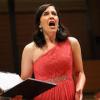
Among the many ensembles that bring affordable and intimate opera productions to the Bay Area, one that may fall under the radar is the Handel Opera Project. Based in Berkeley, the group has produced annual semistaged Baroque operas for about a decade (with a hiatus during COVID, of course). This year’s production, Handel’s Semele, will be part of the Berkeley Festival and Exhibition’s Fringe.
Last week, I talked with the Handel Opera Project’s founder and conductor, William Ludtke, about the group and the show.
Can you tell us about the Handel Opera Project?
As organist at the First Church of Christ, Scientist, I’ve been working with singers for years. Early in my career, I had done a lot of opera, but not Baroque. About ten years ago, a small group of us decided to do [Handel’s] Julius Caesar, and the ensemble just grew from there. Not only is it a lot of fun, but also it’s a way I can give young singers the opportunity to do really good work — which gives them roles to put on their resume for other auditions.

Most of our productions have been in the small hall at the Christian Science Organization building. Because of the acoustics there, we’ve used flutes instead of the oboes that Handel used, with a small string orchestra and harpsichord. We’re doing Semele in the church [First Church of Christ, Scientist in Berkeley], which is a bigger space, so that our audience can be socially distanced — and because it’s a beautiful building. [It was designed by the noted architect Bernard Maybeck and is a National Historic Landmark.]
And even though our name includes “Handel,” we’ve done other composers’ operas — such as Mozart, Monteverdi, and Cherubini. But we do love Handel!
What drew you to Semele — besides its showstopper arias (“Where e’er you walk” and “O sleep”)?
Handel never wrote a bad tune! Semele is from 1746, late in Handel’s life, and is quite different from many of the operas. In fact, it’s an oratorio, with several numbers that remind me of Messiah (there are even hints of the “Hallelujah” chorus). The choruses are integrated into the action — and we try to honor that by having them sung by the principal singers, although Handel probably had a separate chorus.
Also, Semele is funny and very dramatic! It was produced during Lent, when operas weren’t allowed and music was supposed to be sacred. But with all the comic and erotic complications in the action, it caused quite an uproar at the time.

As we do with all our productions, we’ve made cuts to make it more accessible and dynamic — we hope it will be about two hours long. It’s a wonderful story from Ovid, and we work hard to make Handel’s English understandable and the story and the action clear.
After Semele, what’s next for the Handel Opera Project?
We have two concerts planned for the rest of the year, both in First Church. In October, we’ll give a concert that is themed around the High Holidays: Psalms by Liszt, a Tenebrae by Couperin, and the premiere of a work I’ve written on the story of Job. There will be a Christmas concert as well. For next year, we might repeat an earlier production of [Handel’s] Tamerlano, but it’s up in the air for now.
The Handel Opera Project’s Semele plays at the First Church of Christ, Scientist, 2619 Dwight Way, Berkeley, Saturday, June 11 at 2:30 p.m. Tickets are $30 (seniors $20). Singers include Angela Jarosz, Sara Couden, Ellen St. Thomas, Shannon Arcilla, Andrew Green, Reuben Zellman, Don Hoffman, and Wayne Wong.




